七年级英语下册 Unit 2 What time do you go to school学案1(无答案)(2012新版) 人教新目标版
Unit2Whattimedoyougotoschool单元语法点加练习-人教版七年级英语下册

③在实义动词之前:We often go there .我们常去那儿。
④sometimes ,often可位于句首、句中或句末。
SometimesIwalk to school ; sometimesIgo to school by bike.
You should take a shower before going to bed.你睡前应该洗澡。
【要点拓展】
take+名词的短语
take a walk散步take a rest休息一下take a trip旅行take a look看一看
take a bath洗澡take a seat坐下take a break休息一下take a vacation度假
我有时步行去上学,有时骑自行车去上学。
2.难点突破
(1)频率大小
always>usually>often>sometimes>hardly ever>never
(2)对频率副词或频率短语提问用how often“多久(一次)”。
How often does he go swimming?他多久游一次泳?
A. in B. at C. on D. of
10. The boy is always ______me a hand wheneverIam in trouble .
A. give B. giving C. to give D. gave
二、句型转换。
1.Mr .Smithusuallygoes to workat7:00.(对画线部分提问)
人教版七下 Unit 2 What time do you go to school?知识点总结

Unit 2 What time do you go to school?必背短语get up 起床 get home到达家中 get to work到达工作岗位 make breakfast做早饭make a shower schedule做一个洗澡的安排 practice guitar 练吉它 leave home 离家take a shower = have a shower 洗淋浴澡 take the Number 17 bus to the Hotel 乘17路公共汽车去旅馆go to class 上课 go to school 上学 go to work 上班(反义词 go home)have breakfast/dinner/lunch吃早晚午饭put on 穿衣服(反义词take off) do one’s homework 做家庭作业tell sb. about sth. 告诉某人某事 tell sb. to do sth. / tell sb. sth.know about sth. 知道某方面的情况 love to do/doing = like to do/doing 喜欢干某事listen to the early morning news on radio 听电台早间新闻 listen to 听…watch the early morning news on TV 看电视早间新闻around six o’clock 六点左右 in the morning 在早上 in the afternoon 在下午 in the evening 在晚上考点解析※get up 起床 eat breakfast=have breakfast 早餐(三餐前省略冠词)have三餐吃…..※job与 work job与 work 都是指工作,但job是可数名词,work是不可数名词. a job 一份工作 work 可以做动词讲,但是job不可以※Life 生活 lives (复数) health健康 healthy健康的 healthily健康地unhealthy 不健康的 keep health 保持健康 healthy food 健康食品have a healthy life =live a healthy life 过着健康的生活※3个穿的区别:wear 表状态,接服装、手套、眼镜、香水等 put on 表动作,接服装dress 表动作,接sb/ oneself get dressed穿衣语法精讲1,问时间what time或者when what time询问具体时间(几点几分) when:时间、日期、年份、月份等提问2,take a shower=have a shower 沐浴3,at a radio station 在广播电台 from……to ……从……到…..(连接两个时间或地点)4,be/ arrive late for :迟到 be late for school5,exercise 锻炼,练习(动、不可数名词) do/take exercise 做锻炼(运动)6,频度副词(实意动词前;be动词后)Always usually often sometimes seldom hardly never★下面的排列更直观地说明了这几个词的频率的"大小"。
七年级英语下册_Unit2_what_time_do_you_go_to_school知识点__练习和答案
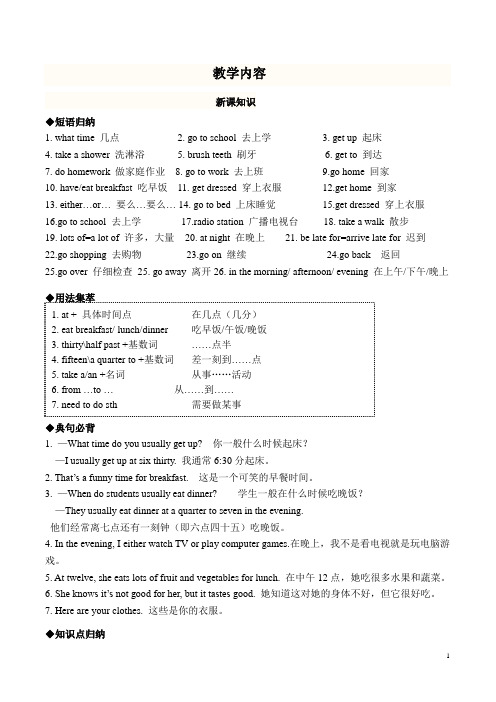
教学内容新课知识◆短语归纳1. what time 几点2. go to school 去上学3. get up 起床4. take a shower 洗淋浴5. brush teeth 刷牙6. get to 到达7. do homework 做家庭作业8. go to work 去上班9.go home 回家10. have/eat breakfast 吃早饭11. get dressed 穿上衣服12.get home 到家13. either…or… 要么…要么… 14. go to bed 上床睡觉15.get dressed 穿上衣服16.go to school 去上学17.radio station 广播电视台18. take a walk 散步19. lots of=a lot of 许多,大量20. at night 在晚上21. be late for=arrive late for 迟到22.go shopping 去购物23.go on 继续24.go back 返回25.go over 仔细检查25. go away 离开26. in the morning/ afternoon/ evening 在上午/下午/晚上◆用法集萃1. at + 具体时间点在几点(几分)2. eat breakfast/ lunch/dinner 吃早饭/午饭/晚饭3. thirty\half past +基数词……点半4. fifteen\a quarter to +基数词差一刻到……点5. take a/an +名词从事……活动6. from …to … 从……到……7. need to do sth 需要做某事◆典句必背1. —What time do you usually get up? 你一般什么时候起床?—I usually get up at six thirty. 我通常6:30分起床。
人教版七年级下册英语《Unit2Whattimedoyougotoschool》词句精讲精练
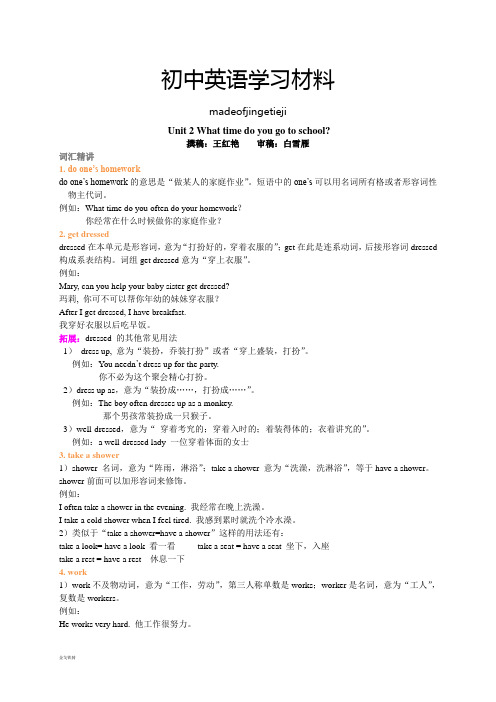
初中英语学习材料madeofjingetiejiUnit 2 What time do you go to school?撰稿:王红艳审稿:白雪雁词汇精讲1. do one’s homeworkdo one’s homework的意思是“做某人的家庭作业”。
短语中的one’s可以用名词所有格或者形容词性物主代词。
例如:What time do you often do your homework?你经常在什么时候做你的家庭作业?2. get dresseddressed在本单元是形容词,意为“打扮好的,穿着衣服的”;get在此是连系动词,后接形容词dressed 构成系表结构。
词组get dressed意为“穿上衣服”。
例如:Mary, can you help your baby sister get dressed?玛莉, 你可不可以帮你年幼的妹妹穿衣服?After I get dressed, I have breakfast.我穿好衣服以后吃早饭。
拓展:dressed 的其他常见用法1)dress up, 意为“装扮,乔装打扮”或者“穿上盛装,打扮”。
例如:You needn’t dress up for the party.你不必为这个聚会精心打扮。
2)dress up as,意为“装扮成……,打扮成……”。
例如:The boy often dresses up as a monkey.那个男孩常装扮成一只猴子。
3)well-dressed,意为“穿着考究的;穿着入时的;着装得体的;衣着讲究的”。
例如:a well-dressed lady 一位穿着体面的女士3. take a shower1)shower 名词,意为“阵雨,淋浴”;take a shower 意为“洗澡,洗淋浴”,等于have a shower。
shower前面可以加形容词来修饰。
例如:I often take a shower in the evening. 我经常在晚上洗澡。
人教版七年级下册英语:Unit 2 What time do you go to school知识点讲解及练习题目及答案
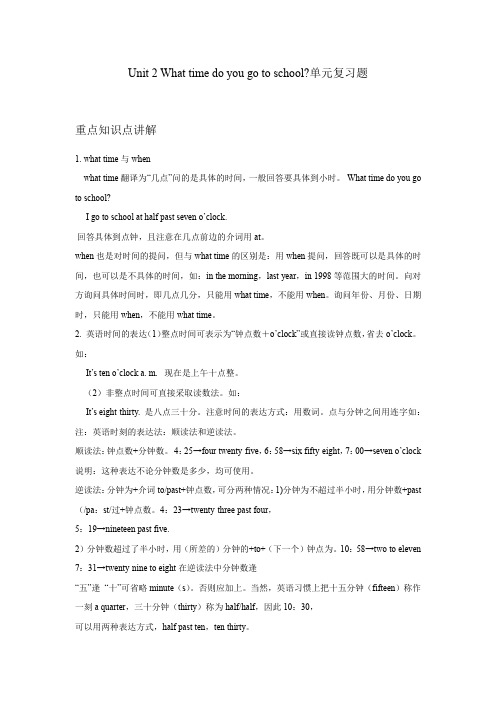
Unit 2 What time do you go to school?单元复习题重点知识点讲解1. what time与whenwhat time翻译为“几点”问的是具体的时间,一般回答要具体到小时。
What time do you go to school?I go to school at half past seven o’clock.回答具体到点钟,且注意在几点前边的介词用at。
when也是对时间的提问,但与what time的区别是:用when提问,回答既可以是具体的时间,也可以是不具体的时间,如:in the morning,last year,in 1998等范围大的时间。
向对方询问具体时间时,即几点几分,只能用what time,不能用when。
询问年份、月份、日期时,只能用when,不能用what time。
2. 英语时间的表达(1)整点时间可表示为“钟点数+o’clock”或直接读钟点数,省去o’clock。
如:It’s ten o’clock a. m.现在是上午十点整。
(2)非整点时间可直接采取读数法。
如:It’s eight-thirty. 是八点三十分。
注意时间的表达方式:用数词。
点与分钟之间用连字如:注:英语时刻的表达法:顺读法和逆读法。
顺读法:钟点数+分钟数。
4:25→four twenty-five,6:58→six fifty-eight,7:00→seven o’clock 说明:这种表达不论分钟数是多少,均可使用。
逆读法:分钟为+介词to/past+钟点数,可分两种情况:1)分钟为不超过半小时,用分钟数+past (/pa:st/过+钟点数。
4:23→t wenty-three past four,5:19→nineteen past five.2)分钟数超过了半小时,用(所差的)分钟的+to+(下一个)钟点为。
10:58→two to eleven 7:31→twenty-nine to eight在逆读法中分钟数逢“五”逢“十”可省略minute(s)。
人教版七年级英语下册《Unit 2 What time do you go to school》教案

《Unit 2 What time do you go to school》教案Teaching objectives knowledgeThetarget1. Learn and master the following words:up get up dress g et dressed brush toothshower take a shower usually forty wownever early fifty job work station radiostation o’clock night funny exercise2. To learn to ask and talk about the spokenlanguage of the time, make the schedule:-What time do you usually take a shower?-I usually take a shower at six forty.-What time do you usually get up?-I usually get up at eight thirty at night.AbilitytoThetarget1) learning with credit to special questions abouttime and time.2) with the knowledge of the target language t o lifeand learning activities to make plans, to reasonablyarrange work and rest time.emotionalTheSection A, talk about the topic is "routine" time,the learning content close to student's life, becausethe students' work and rest time arrangement is verytarget regular. By asking each other or talk about yourself or a loved one's work and rest time arrangementand activity plan, and punctuality can cultivatestudents' good habit, the habit.Teaching important points Learn to ask and talk about time and make the schedule.Teaching difficultpoints Credit to guide the expression of special questionsand time.The teachingmethodTask-based teaching method and teaching.。
英语七年级下册语法Unit2What-time-do-you-go-to-school

Unit 2 What time do you go to school ? 一.What time 什么时候,几点钟。
常用于对具体的(确切的)时间提问,也可用when来替换,但反之不一定行。
1. What time/ When do you get up in the morning?I get up at six o’clock in the morning.2. What time is it ? / What’s the time ?It’s six-thirty. / It’s half past six.二.★关于时间的表达法:顺读法,逆读法。
1. 顺读法:按汉语的习惯,先说点后说分的方法。
结构:点+分。
5:10 five-ten 8:30 eight-thirty9:46 nine forty-six 1:05 one-five整点的读法:基数词+o’clock7:00 seven o’clock 12:00 twelve o’clock2. 逆读法:借助介词past或to, 先说分后说点的方法,其结构为:分+past/to +点past 过to 差①当分钟数小于或等于30分钟时,用介词past表示。
7:05 five past seven 6:30 thirty past six =half past six30 thirty=half an hour 11:25②当分钟数大于30时,用介词to表示:几点差几分。
其结构为:(60-分)+to +(点+1)11:50 ten to twelve 9:45 fifteen to ten =a quarter to ten7:55 3:35hour 小时minute 分second 秒quarter 一刻钟写出同义句:seven thirty = ____ ____ seven eight forty = ____ ______ nine 三.★感叹句What a funny time to eat breakfast !What a lucky guy!定义:表示喜怒哀乐等强烈感情的句子叫感叹句。
PEP人教版英语七年级下册 Unit 2 What time do you go to school
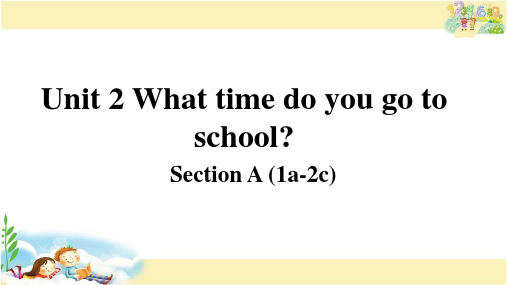
Rick:
I ´brush my teeth and ´take a shower at six forty.
Interviewer: Hmm. ´What time do you ´eat breakfast?
Rick: get d´rSeessveedn为´o固’c定loc短k.语,表示穿的动作。其后不可接任何宾语。
Choose the right options to complete the text.
wash my face have a bath
take a shower
I ___ta_k_e_a__sh_o_w_e_r__ at ___e_i_gh_t__fi_v_e___.
eight o’clock eight five
Draw the time by yourself and ask your partner to read it.
Do you know how to read the time? Please fill in the blanks.
Rule: Say the _h__o_u_r_ first and then the minute. e.g. 6:25—It’s six twenty-five.
fifty.
o’clock. fifteen. twenty. thirty. forty-five.
Let’s read more times! What’s the time?
It’s ten ten.
It’s nine seven.
It’s four forty-three.
It’s one fifty-one.
Bob
Mary
Jack
【拔高教育】七年级英语下册 unit 2 what time do you go to school短语、语法知识点汇总
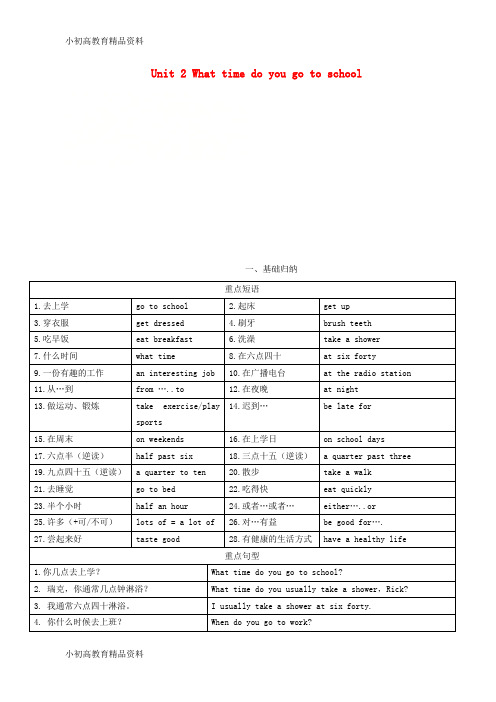
Unit 2 What time do you go to school一、基础归纳【教材内容解析】Section A1.get dressed (P. 7)get dressed意为“穿上衣服”,dress用作动词,表示“给(某人)穿衣服”,接宾语时,只能接表示人的名词或者代词。
He can’t dress himself.I usually dress my daughter before I go to work.【拓展】辨析wear, put on和dress2.take a shower (P. 7)take a shower意为“洗淋浴”,相当于have a shower,shower用作名词,表示“淋浴”。
I often take a shower in the evening.I take a cold shower when I feel tired.3.What time do you usually get up, Rick? (P. 7)(1)what time用来询问具体的时间点,表示“什么时候”。
What time do you go to school?(2)usually是频度副词,意为“通常、一般”,在句中作状语,一般位于实义动词之前,连系动词be、助动词或者情态动词之后。
I usually have lunch at school.He usually goes to school by bike.4.I never get up so early. (P. 8)early此处用作副词,表示“很早地”,反义词为late,意为“晚地”。
Please come to school early tomorrow.【拓展】early还可以用作形容词,表示“早的、提前的”,反义词是late,意为“晚的”。
He gets up early to catch the early bus.5.Scott has an interesting job. (P. 8)job用作可数名词,表示“工作”,强调具体的职业或者工作,work表示“工作”时,用作不可数名词,指人们日常生活和工作中从事的体力或者脑力劳动,及各类工作。
七年级英语下册Unit2Whattimedoyougotoschool短语语法知识点汇总人教版
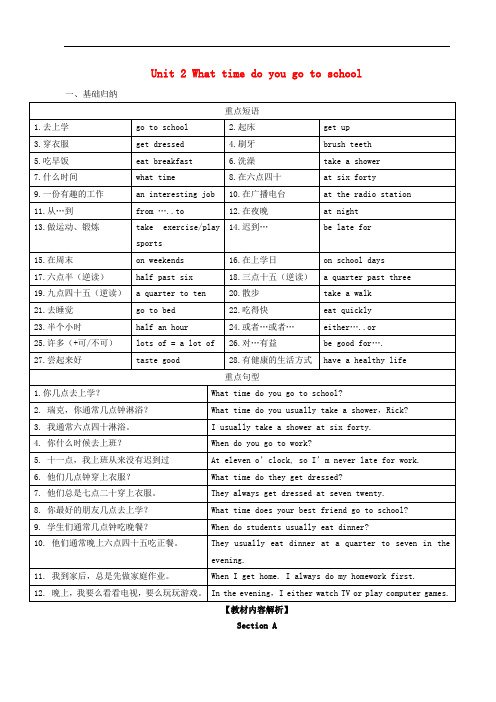
Unit 2 What time do you go to school 一、基础归纳【教材内容解析】Section A1.get dressed (P. 7)get dressed意为“穿上衣服”,dress用作动词,表示“给(某人)穿衣服”,接宾语时,只能接表示人的名词或者代词。
He can’t dress himself.I usually dress my daughter before I go to work.【拓展】辨析wear, put on和dress2.take a shower (P. 7)take a shower意为“洗淋浴”,相当于have a shower,shower用作名词,表示“淋浴”。
I often take a shower in the evening.I take a cold shower when I feel tired.3.What time do you usually get up, Rick? (P. 7)(1)what time用来询问具体的时间点,表示“什么时候”。
What time do you go to school?(2)usually是频度副词,意为“通常、一般”,在句中作状语,一般位于实义动词之前,连系动词be、助动词或者情态动词之后。
I usually have lunch at school.He usually goes to school by bike.4.I never get up so early. (P. 8)early此处用作副词,表示“很早地”,反义词为late,意为“晚地”。
Please come to school early tomorrow.【拓展】early还可以用作形容词,表示“早的、提前的”,反义词是late,意为“晚的”。
He gets up early to catch the early bus.5.Scott has an interesting job. (P. 8)job用作可数名词,表示“工作”,强调具体的职业或者工作,work表示“工作”时,用作不可数名词,指人们日常生活和工作中从事的体力或者脑力劳动,及各类工作。
中学七年级英语下册 Unit 2 What time do you go to school过关短语

Unit 2 What time do you go to school 1.go to school / go to school late/ go to work / go to work late去上学/ 上学迟到/ 去上班/上班迟到go home /get home from school 回家/ 从学校到家2. get up /get up late/ get up early / get dressed/ get home起床/起得晚/起得早/ 穿衣/ 到家/3. brush the teeth /wash face/ clean the room/ eat breakfast /eat lunch/eat dinner.刷牙/ 洗脸/ 打扫房间/ 吃早饭/ 吃午饭/吃晚饭4. take a shower =have a shower 洗澡5. an interesting job 一份有趣的工作6. at a radio station 在一家广播电台7. from twelve o’clock at night to six o’clock in the morning从晚上12点到早上六点8. in the morning /in thee afternoon /in the evening /at night在早上/ 在下午/在晚上9. go to work late=be late for work 上班迟到go to school late= be late for school上学迟到10. in our group 在我们团队里11. do one’s homework /take a walk/ go to bed做家庭作业/ 散步/上床睡觉12. eat quickly 吃的快13. half an hour 半小时14. eat a good breakfast 吃一顿丰盛的早餐15. taste good 尝起来不错16. It’s time for sth/ v-ing =It’s time to do sth 到了做某事的时候了17. have (much)time for sth/ v-ing 有太多的时间做某事18. have no time to do sth= don’t/doesn’t have time to do sth 没时间做某事19. be good for +名词人称代词动词的ing形式有利于某事/某人二.写出下列词的单三形式和ing 形式。
七年级下册unit2-What-time-do-you-go-to-school-知识点讲解与练习

1.What time do you get up?释:这是一个由疑问词what time(几点)引导的特殊问句。
其结构:What time +助动词do/does +主语+动词原形,询问某人做某事的具体时间。
例如:what time do you begin class in the morning?你们早晨几点开课?注:What’s the time=What time is it?也是用来询问时间,意为“几点了”。
用it作答。
例如:What’s the time? It’s 7:30.几点了?七点半了。
2.I usually get up at five o’clock. 我通常在五点钟起床。
释:1)句中usually与often 一样都是频度副词,常用于动词be 之后,行为动词之前。
always意思是“总是”、“永远”,表示动作重复,状态继续,中间没有间断,通常用来修饰动词的一般时态。
例如:We always get up before six o'clock.我们总是六点前起床。
若修饰动词进行时,则有“老是”,“再三地”的意思,带有厌烦、不满、赞美等感情色彩。
例如:You are always coming late.你老是迟到。
(含有责备的意思)He is always thinking of others.他总是想着别人。
usually(75%)意为“通常”,着重表示已习惯的动作。
反义词为:unusually。
例如:They usually have four classes in the morning.他们上午通常上四节课。
They usually do some shopping on Sunday.他们通常星期天买东西。
often(50%)意为“时常”、“经常”,表示常常这样,但不总是这样,反义词为:seldom。
例如:She often helps her mother with her housework after school.放学后她常常帮助母亲做家务。
七年级英语下册Unit-2-What-time-do-you-go-to-school教案
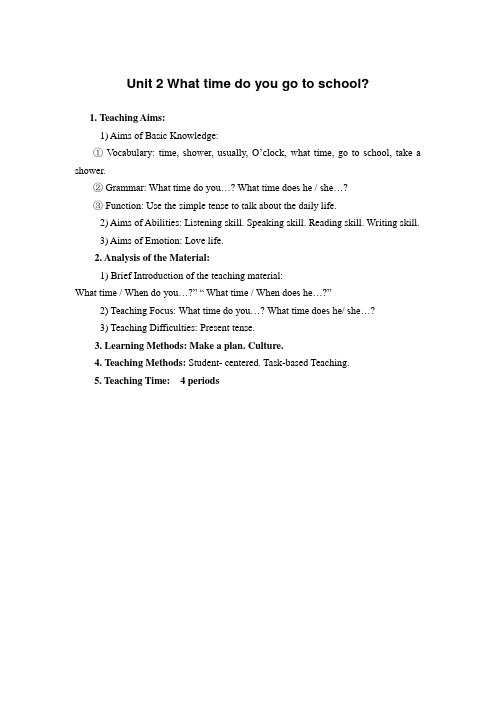
Unit 2 What time do you go to school?1. Teaching Aims:1) Aims of Basic Knowledge:①V ocabulary: time, shower, usually, O‟clock, what time, go to school, take a shower.②Grammar: What time do you…? What time does he / she…?③ Function: Use the simple tense to talk about the daily life.2) Aims of Abilities: Listening skill. Speaking skill. Reading skill. Writing skill.3) Aims of Emotion: Love life.2. Analysis of the Material:1) Brief Introduction of the teaching material:What time / When do you…?” “ What time / When does he…?”2) Teaching Focus: What time do you…? What time does he/ she…?3) Teaching Difficulties: Present tense.3. Learning Methods: Make a plan. Culture.4. Teaching Methods: Student- centered. Task-based Teaching.5. Teaching Time: 4 periodsPeriod 1(Section A: 1a-2a)授课人:______ 授课班级: _____ 授课时间:2014年___月___日____午第____节Step One: Warming-upGreetingT: Good afternoon, everyone.Ss: Good afternoon, Miss Yang.Step Two: Presentation1.Adjust the time, and ask students questions.T: What time is it? Ss: It‟s 12 o‟clock. ( Write on Bb )( Help Ss to say )T: What time is it? Ss: It‟s 10:15.( Help Ss to say )2.Ask one student to come to the front, adjust the time and ask the otherstudents.S1: What time is it? Ss: It‟s 9 o‟clock.3.Teach the new words & phrases.Show some pictures of different clocks and the activities.T: I‟m very busy these days. Can you guess what time I get up / eat breakfast / go to school / run / take a shower? ( Write on Bb)T: I usually get up at 6:35. ( Teach Ss the new word “ usually” )S1: You usually eat breakfast at …S2: You usually run at…S3: You usually take a shower at …4.Ask Ss to do the exercise of 1a, and then check the answers.Step Three: Listening1.Show Ss the timetable of Rick‟s ( write on small Bb )Ask Ss listen to the recorder and fill in the chart.Then check the answers.2.Ask and answer.T: What time does Rick get up / eat breakfast / run / go to school / take a shower ?Ss: He gets up / eats breakfast / runs / goes to school / takes a shower at…( Ask Ss pay attention to the underlined phrases.)Step Four: Consolidation1.Ask Ss to look at the pictures and tell their days.Example: I usually get up at …. I eat breakfast at …. I go to s chool at …. At …, I takea shower.Step Six: Homework1.Try to remember all the words & phrases.2.Survey: Ask your classmates their routines, and give your report.3.Plan: January 1st is coming. Please plan it, and make your day wonderful.Step Seven Blackboard DesignReflection after class:_____________________________________________________________________ _____________________________________________________________________ _____________________________________________________________________ _______________________Period 2 (Section A: 2b-Grammar Focus)授课人:______ 授课班级: _____ 授课时间:2014年___月___日____午第____节1. Aims and demands :1) Language skills :Ss learn to talk about kinds of transportation, and how long it takes to go places, and how far apart places are.2) Target Language : Words : how far , get to , bicycle , subway , bus stop, train station , minute, kilometer, mile , transportation , calendarSentences: How do you get to school ? / How long does it take ? / How far is it ? 3) Moral object : Through learning this unit , Ss can enable them to care for each other whenever crossing the roads and pay attention to the sign of traffic.2. Analysis of the material:Students have learned the transportation before.. In this unit ,they need to learn more details about the transportation. At the same time ,they need to learn “How long and How far” and they can use them freely.3. Teaching methods:pairwork , groupwork ,listening and speaking, practicing4, learning strategies:Personalizing Inferring vocabulary5.Teaching aids:Tape recorder, a projector or a computer6.Teaching period:Four periods.Period 3 (Section B: 3a-3c)授课人:______ 授课班级: _____ 授课时间:2014年___月___日____午第____节1. Aims and Demands: Key vocabulary, How do you get to school ? How does he getto school ?2. Teaching methods : Listening Writing Pairwork3. Teaching Aids : A tape recorder.Step I Leading inT: Good morning, everyone! You know I live far away ,so I go to school by bus every day. What about you? David, “How often do you go to school?”S:--------T: So we will talk about how to get to places in this unit.Step IINow I will show you pic tures and let‟s review the transportations we know. Then we will learn more about it .(take the subway) Please open your books and finish 1a. Step III1. There are five names in 1b.Now they are in the picture. We should find them.2. Play the tape .They should listen carefully and find the persons .Write the numbers next to the correct students in the picture above. After listening , check the answers together .Step IVPoint to the example in the box , ask two students to read it .then ask them to make up their conversations about how the people in the picture get to school .Teacher choose some pairs to act their conversations.Step VPracticing the listening :T: I will play two conversations The people are talking about how students get to school and how long it takes .The first time check the kinds of transportation that you hear. The second time match the time with the kinds of transportation activity 2a.Step VI1. Pay attention to the picture and dialogue.2. Make your own dialogue into pairs.3. Act it in front of the students.Step VIISummary and homework: This class we have learnt some key vocabulary and the target language .I hope after class you can survey how does your friends get to school .and pre-revise the 3a,3b.Step VIII Blackboard DesignReflection after class:_____________________________________________________________________ _____________________________________________________________________ _____________________________________________________________________ __________________________________Period 4授课人:______ 授课班级: _____ 授课时间:2014年___月___日____午第____节。
七年级英语下册Unit-2-What-time-do-you-go-to-school知识点总结

Unit 2 What time do you go to school?一、重点词汇〔1〕重点单词和短语get up起床get dressed穿衣服brush teeth/ brush one’s teeth刷牙eat/have breakfast吃早餐run跑步take a shower洗澡;沐浴go to work去工作at a radio station在广播电台radio show广播节目go to school去上学get to school到达学校have English class上英语课have Music class上音乐课play the guitar弹吉他play basketball打篮球play sports做运动eat/have lunch吃午餐after school放学后after class下课后go home回家eat/have dinner吃晚餐take a walk去散步do one’s homework做某人的家庭作业clean one’s room打扫某人的房间go to bed上床睡觉got to bed early/late睡的早/晚on weekends在周末on weekdays在工作日on school days在学校上课日best friend好朋友/最好的朋友eat ice-cream吃冰淇淋eat vegetables吃蔬菜play computer games玩电脑游戏eat a nice/good breakfast吃一份不错的早餐fruits and vegetables水果和蔬菜(2)about 表示“大约〞E.g. She always exercises about seven ten.It’s about 5 kilometers from my home to the school.(3)from...to... “从....到...〞E.g. She works from nine a.m. to five p.m. everyday.〔4〕介词for表示“为了...;对于...〞for breakfast/ lunch/ dinnerE.g. I sometimes eat chicken and rice for lunch.Mike eats fruits and vegetables for dinner.〔5〕after 表动作时间的先后,表示“在...之后〞after school/class/lunch/dinner before 表示“在...之前〞before breakfast/ lunch/ dinnerE.g. I often play sports before breakfast.Mr. Li usually takes a walk after dinner.〔6〕much;many;lots of/ a lot of都表示“许多〞;区分:much+不可数名词;many+可数名词复数;lots of/ a lot of+可数名词复数/不可数名词E.g. I don’t have much time for breakfast. = I don’t have lots of/ a lot of time for breakfast. (time时间为不可数名词)Linda bought many new pens. = Linda bought lots of/ a lot of new pens. (pen为可数名词)〔7〕either A or B 表示“要么A要么B〞,做主语时,根据就近原那么来选择动词形式。
七年级Unit_2_What_time_do_you_go_to_school知识点
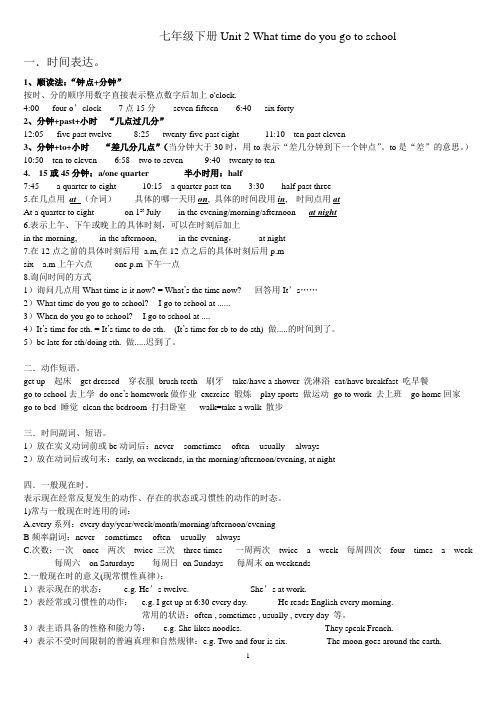
七年级下册Unit 2 What time do you go to school一.时间表达。
1、顺读法:“钟点+分钟”按时、分的顺序用数字直接表示整点数字后加上o'clock.4:00 four o’clock 7点15分seven fifteen 6:40 six forty2、分钟+past+小时“几点过几分”12:05 five past twelve 8:25 twenty-five past eight 11:10 ten past eleven3、分钟+to+小时“差几分几点”(当分钟大于30时,用to表示“差几分钟到下一个钟点”。
to是“差”的意思。
)10:50 ten to eleven 6:58 two to seven 9:40 twenty to ten4. 15或45分钟:a/one quarter 半小时用:half7:45 a quarter to eight 10:15 a quarter past ten 3:30 half past three5.在几点用at (介词)-- 具体的哪一天用on, 具体的时间段用in, 时间点用atAt a quarter to eight on 1st July in the evening/morning/afternoon at night6.表示上午、下午或晚上的具体时刻,可以在时刻后加上in the morning, in the afternoon, in the evening,at night7.在12点之前的具体时刻后用a.m,在12点之后的具体时刻后用p.msix a.m上午六点one p.m下午一点8.询问时间的方式1)询问几点用What time is it now? = What’s the time now? 回答用It’s……2)What time do you go to school? -- I go to school at ......3)When do you go to school? -- I go to school at ....4)It’s time for sth. = It’s time to do sth. (It’s time for sb to do sth) 做.....的时间到了。
人教版七年级英语下册Unit 2 知识点总结+单元测试(word版,含答案)
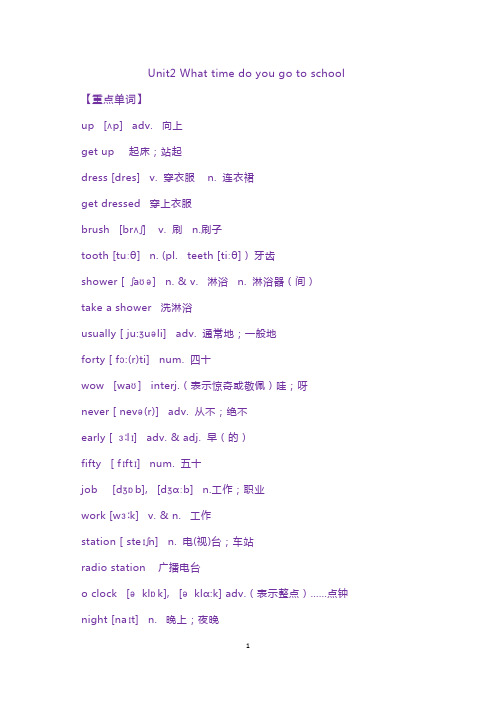
Unit2 What time do you go to school 【重点单词】up [ʌp] adv. 向上get up 起床;站起dress [dres] v. 穿衣服 n. 连衣裙get dressed 穿上衣服brush [brʌʃ] v. 刷 n.刷子tooth [tuːθ] n. (pl. teeth [tiːθ] ) 牙齿shower [ ʃaʊə] n. & v. 淋浴 n. 淋浴器(间)take a shower 洗淋浴usually [ ju:ʒuəli] adv. 通常地;一般地forty [ fɔ:(r)ti] num. 四十wow [waʊ] interj.(表示惊奇或敬佩)哇;呀never [ nevə(r)] adv. 从不;绝不early [ ɜːlɪ] adv. & adj. 早(的)fifty [ fɪftɪ] num. 五十job [dʒɒb], [dʒɑːb] n.工作;职业work [wɜːk] v. & n. 工作station [ steɪʃn] n. 电(视)台;车站radio station 广播电台o clock [əklɒk], [əklɑ:k] adv.(表示整点)……点钟night [naɪt] n. 晚上;夜晚funny [ fʌnɪ] adj. 奇怪的;滑稽好笑的exercise [ eksəsaɪz] v. & n. 锻炼;练习on weekends (在)周末best [best] adj. 最好的 adv. 最好地;最group [gruːp] n. 组;群half [hɑːf], [hæf] n. & pron. 一半;半数past [pɑːst], [pæst] prep. 晚于;过(时间)adj. 过去的quarter [ kwɔː(r)tə(r)] n.一刻钟;四分之一homework [ həʊmwɜː(r)k] n. 家庭作业do (one’s) homework 做作业run [rʌn] v. 跑;奔clean [kliːn] v. 打扫;弄干净 adj. 干净的walk [wɔːk] n. & v. 行走;步行take a walk 散步;走一走quickly [ kwɪkli] adv. 很快地either [ aɪðə(r)], [ iːðə(r) ]adv. 或者;也(用在否定词组后)either…or …要么……要么……;或者……或者……lot [lɒt], [lɑ:t] pron. 大量;许多lots of 大量;许多sometimes [ sʌmtaɪmz] adv. 有时taste [teɪst] v. 有……的味道;品尝 n.味道;滋味life [laɪf] n. 生活;生命【重点短语】1. go to school 去上学2. get up 起床3. get dressed 穿衣服4. brush teeth 刷牙5. eat breakfast 吃早饭6. take a shower 洗澡7. what time 什么时间8. at six forty 在六点四十9. an interesting job 一个有趣的工作10. at the radio station 在广播电视台11. usually /always/ often/ sometimes/ never 经常/总是/经常/有时/从不12. your radio show 你的广播节目13. from …..to 从….到…..14. at night 在夜晚15. a funny time 一个有趣的时间16. take exercise 锻炼17. be late for….. 因…迟到18. at about ten twenty 在大约十点二十19. on weekends 在周末20. on school days 在上学日21. half past six 六点半22. a quarter past three 三点过一刻(3:15)23. a quarter to ten 十点差一刻(9:45)24. do (one’s)homework 做(某人的)家庭作业25. take a walk 散步26. go to bed 睡觉27. eat quickly 吃得快28. have much time 有许多时间29. half an hour 半个小时30. get home 到达家31. either…..or 或者…….或者......32. eat a good breakfast 好好吃顿早餐33. lots of = a lot of 许多34. be good for….. 对…….有益35. taste good 尝起来好36. do her homework 做她的家庭作业37. have a healthy life 有一个健康的生活方式38. have dinner 吃晚饭【重点句型】1. What time do you go to school?你几点去上学?2. 一What time do you usually take a shower,Kick?瑞克,你通常几点钟淋浴?—I usually take a shower at six forty.我通常六点四十淋浴。
人教版七年级英语下复习Unit2 What time do you go to schoo

(2013·山东潍坊)When did the terrible earthquake happen in Sichuan? It happened_____8:02____the morning of April 20th,2013.
A.on;in B.at;on C.at;in D.on;on
go home 回家 letter n.信
around adv.大约
start v.开始;出发 write v.书写;写
tell v.告诉;讲述 me pron.我(I的宾格)
soon adv.不久
wish n.希望;祝愿
best (good,well最高级)最好的(地)
Saturday n.星期六 am (a.m.)上午 survey n.调查;考察
o’clock adv.(只用于正点)......点钟 work v.&n. 工作
hour n.小时 brush v.刷
teeth n.(tooth复数)牙齿
after 在......之后 go to work 去上班
get to 到达
bus n.公共汽车 hotel n.旅馆
all prep.全部;全体
in May in summer in 2011
介词on用在日期、星期几、节日前,也可表示具体
某一天的早上、下午、晚上等。
usually 频率副词 usually: 频度副词,意为“通常”。
在句中作状语,一般位于实义动词之前, 系动词、助动词或情态动词之后。
Eg: I usually have lunch at school.
逆读法: 借助介词past或to 。 小于等于30分钟:分钟+past+小时 几点过几分
人教版七年级英语下册Unit 2 What time do you go to school知识点归纳总结

Unit 2 What time do you go to school?◆短语归纳1. what time 几点2. go to school 去上学3. get up 起床 go to bed 上床睡觉(反义词get up )4. take a shower = have a shower 洗淋浴5. brush teeth 刷牙6. get to 到达7. do homework 做家庭作业 8. go to work 去上班(反义词 go home )9. go home 回家 10. eat breakfast 吃早饭 11. get dressed 穿上衣服12. get home 到家13. either…or… 要么…要么… 14. make breakfast 做早饭15. in the morning/ afternoon/ evening 在上午/下午/晚上 16. take a walk 散步17. lots of=a lot of 许多,大量 18. radio station 广播电台 19. at night 在晚上20. be late for=arrive late for 迟到21.make a shower schedule 做一个洗澡的安排22. have breakfast/dinner/lunch 吃早晚午饭 23.get to work 到达工作岗位24.practice guitar 练吉它25.leave home 离家26.go to class 上课27.take the Number 17 bus to the Hotel 乘17路公共汽车去旅馆◆用法集萃 ◆典句必背 1. What time do you usually get up? I usually get up at six thirty. 2. That’s a funny time for breakfast. 3. When do students usually eat dinner? They usually eat dinner at a quarter to seven in the evening.4. In the evening, I either watch TV or play computer games.5. At twelve, she eats lots of fruit and vegetables for lunch..6. She knows it’s not good for her, but it tastes good.7. Here are your clothes.◆语法1. at + 具体时间点 在几点(几分)2. eat breakfast/ lunch/dinner 吃早饭/午饭/晚饭3. thirty\half past +基数词 ……点半4. fifteen\a quarter to +基数词 差一刻到……点5. take a/an +名词 从事……活动6. from …to … 从……到……7. need to do sth 需要做某事8.around six o’clock 六点左右9.tell sb. about sth. 告诉某人某事 tell sb. to do sth. / tell sb. Sth. 10.know about sth. 知道某方面的情况 11.love to do/doing = like to do/doing 喜欢干某事 12.Listen to the early morning news on radio 听电台早间新闻 13.watch the early morning news on TV 看电视早间新闻1、英语时间的表达(1)整点时间可表示为“钟点数+o’clock”或直接读钟点数,省去o’clock。
新人教 英语 七年级下册Unit2 What time do you go to school知识点详解

Unit 2 What time do you go to school?知识点详解单元目标总览:【知识点详解】1、What time do you usually get up,Rick?what time 意为“几点;什么时间”,其引导的特殊疑问句用来询问具体的时间点◆---What time do you get up in the morning?你早上几点起床?---At about 7 o’clock.大约在7点。
拓展:what time与whenwhat time翻译为“几点”问的是具体的时间,一般回答要具体到小时。
What time do you go to school? 你什么时候/几点上学?I go to school at half past seven o’clock. 我七点半去上学。
回答具体到点钟,且注意在几点前边的介词用at。
when也是对时间的提问,但与what time的区别是:用when提问,回答既可以是具体的时间,也可以是不具体的时间,如:in the morning,last year,in 1998等范围大的时间,例如:When does he take a shower?他什么时候洗澡?He takes a shower in the morning. 他在早上洗澡。
也可用具体时间:I take a shower at 6 o’clock in the morning. 我早上六点洗澡。
2、get dressed穿上衣服dress做动词,意为“穿衣服”,其宾语多是人,常用短语:dress sb 给某人穿衣服◆The boy can dress himself.这个男孩可以自己穿衣服。
get dressed穿上衣服,表示动作◆Get up and get dressed.起床穿衣服。
be dressed in 穿着,强调状态◆She is dressed in red clothes.她穿着红色的衣服。
- 1、下载文档前请自行甄别文档内容的完整性,平台不提供额外的编辑、内容补充、找答案等附加服务。
- 2、"仅部分预览"的文档,不可在线预览部分如存在完整性等问题,可反馈申请退款(可完整预览的文档不适用该条件!)。
- 3、如文档侵犯您的权益,请联系客服反馈,我们会尽快为您处理(人工客服工作时间:9:00-18:30)。
Unit 2 What time do you go to school ?导学案Section A (1a-2c)一.学习目标:1.知识目标: 学习用when和what time引导的特殊疑问句询问时间的用法能用英语表达正确的时间。
2.技能目标: 学会用频率副词谈论自己日常生活及日常作息习惯。
3.情感目标:培养良好的作息习惯和守时习惯。
二.课前预习:(预习课文,试着翻译下列短语和句子。
)(1) 去上学 ___________ (2) 起床__________ (3)吃早饭_______ _____(4) 淋浴,洗澡_____________ (5) 几点,什么时候_____ _______(6) 在五点整____ ___(7)穿衣____ ____(8) -你通常几点钟起床? -我通常在五点整起床。
-_____ _____ do you _______ get up? -I usually _____ up _____ five o’clock.三、课堂活动:1.复习、回顾数词的构成和使用。
2.时间表达法,并练习时间表达法。
3.学习有关的动词短语,观察1a部分的图片,将词语与图画进行搭配,并完成1b的听力训练。
4. 观察2a的图片,谈谈图中的人在干什么?注意图中人物数量并完成2a.5.看清2b表格中的人物,听力时重点在时间。
6.照例子完成2c对话练习。
(两人一组,一问一答)四.重点解析:A.时间表达法:时间前通常用at. at 5 o’clock 在五点整 at 7:30 在七点半1.点钟数 + 分钟数:eg: 6: 15 six fifteen 7: 29 seven twenty-nine2.分钟数 + past +点钟数(分钟数不超过30分) 6: 15 a quarter(刻钟)past six3.差分钟数 + to +下一点钟数(分钟数超过30分)例如: 5: 45 a quarter to sixB.always与usually的区别:表示动作频率的词,主要有usually/ sometimes/always/often。
程度的区别为:always(100%)>usually(80%)>often(60%)>sometimes(40%)>seldom(20%)> never (0%)C.一般现在时:一般现在时:表示通常性、规律性、习惯性的状态或者动作.在一般现在时中,当主语是第三人称单数时,谓语动词要用第三人称单数形式,即常在动词原形后加-s或-es。
主语为非三单,动词用原形。
例如:1.She has lunch at twelve. 她十二点吃午餐。
2.Tom and Mike like waching TV.五.巩固提升:1用动词适当形式填空:1.Jim with me often ______(play)basketball after class.2.Rick`s family_______(take) a shower every day.3.He ________(eat) rice for breakfast.4.What time _____(do)your father eat breakfast?5.______your brother _____(run ) in the morning ?2. 按要求做题:1) Mary takes a shower at 8:00.(变一般疑问句)_____ Mary _____ a shower at 8:00?2) I usually go to bed at 10:00.(变否定句)I _____ usually _____to bed at 10:00. 3)LinHai helps his mother with the housework on Sundays.(变否定句)LinHai _____ ______mother with the housework on Sundays.4)We eat breakfast at seven o`clock.(划线提问) ______ ______ do you eat breakfast ?5) -玛丽通常几点钟吃早饭? -她通常在七点半吃早饭。
-______ ______ _______ Mary usually eat _________ ?-She usually eats breakfast _____ 7:30.六、总结反思:Unit 2 What time do you go to school ?Section A (2d-3c)一、学习目标:1.知识目标: 继续学习用英语正确表达时间;2.技能目标:学会更合理地安排自己的学习和课外活动时间;能熟练叙述日常生活活动;3.情感目标: 学会合理安排时间,加强时间的计划性。
二.课前预习1.写出这些动词的第三人称单数形式。
work_______ get______ brush _______ have _______ eat ________play ________ go ________ take ________ watch _________2. 预习2d的短文,翻译短语和句子:1 )在电台上班 2)在晚上 3)大概在十点二十4)那很奇怪 5)我上班从不迟到三.课堂活动1.单词检查和对话练习。
2.听录音了解scott的生活习惯,分角色读2d,。
3. 注意Grammer Focus里面的问句及回答,对时间提问是重点。
4.完成3a,2—3人把答案写在黑板上,注意always,uaually和never的用法。
5.自己根据3a,用always,uaually和never写出关于自己的句子6.四人一组调查同学的生活习惯,分别调查三名同学并把情况反映在表格中。
四.重点讲解1.always与usually的区别:表示动作频率的词,主要有usually/ sometimes/always/often。
程度的区别为:always(100%)>usually(80%)>often(60%)>sometimes(40%)>seldom(20%)> never (0%)2. 动词的三单形式:1)一般动词+s:make – makes;2)以s、sh、ch、o、z、x结尾的动词+es:wash – washes go – goes;3)以辅音字母加y结尾的动词改y为i再加es:fly – flies cry – cries;4)以元音字母加y结尾的动词直接加s:play – plays。
五.巩固提升A.用所给动词的适当形式填空:1. He ________ (go) to work at five every day2. Can you______ (help) me with English?3. People love ___________ (listen) to him.4. Dave ______________ (not take) a bus to school every day.5. -What time _________ Lucy usually __________(get) home?-She usually ________ (get) home at 5:00.B.选择填空题( )1. He ____________________ at 6:00 in the afternoon.A. get homeB. gets to homeC. gets home( )2. It’s time ________________ school.A. go toB. forC. to go( )3. We usually eat _______________ lunch at 12:30.A. myB. theC. X( )4. Mike often ________________ a shower in the morning.A. makesB. haveC. takes( )5. Do you often watch news _______________ TV?A. byB. onC. in六.总结反思Unit 2 What time do you go to school ?SectionB(1a—1e)一.学习目标1.记住时间和表日常活动的短语。
如,do homework.2.注意听力的技巧,听有用的信息。
3.能熟练进行口语练习谈论他人作息时间。
二.课前预习翻译下面短语1.吃晚饭2.做作业3.打扫房间4.去上学5.去散步6.回家7.去睡觉三.课堂活动1.复习时间表达法。
2.完成 1a,注意时间和活动。
3.二人一组仿造对话谈论4.观察1c的活动,自己先读一读,听力时注意活动。
5.在听录音完成 1 d. , 注意活动对应时间。
四.重点讲解时间表达法:时间前通常用at. at 5 o’clock 在五点整 at 7:30 在七点半1.点钟数 + 分钟数:eg: 6: 15 six fifteen 7: 29 seven twenty-nine2.分钟数 + past +点钟数(分钟数不超过30分) 6: 15 a quarter(刻钟)past six3.差分钟数 + to +下一点钟数(分钟数超过30分)例如: 5: 45 a quarter to sixUnit 2 What time do you go to school ?SectionB(2a—3b)一.学习目标1.通过 2b的学习,了解什么是健康的生活习惯。
2.提高阅读速度,学会抓住关键信息。
3.能通过对2d 的学习,写出自己的作息时间表。
二.课前预习翻译下面的短语1.刷牙2.吃许多的蔬菜和水果3. 半小时4.吃冰淇淋5.我既不看电视也不打游戏。
I watch TV play computergames.三.课堂活动1.完成2a2.读2b短文勾出你认为健康的生活方式。
3.完成2c.4.完成3a后根据2b和3a写自己的时间表。
四.重点讲解A.后面加时间的介词的用法和区别:in :1.表示在较长的时间里(如周/月份/季节/年份/世纪等)。
如:in a week; in May;in spring/summer/autumn/winter; in 2008;in the 1990’s等。
2.表示在上午、下午或晚上。
如:in the morning/afternoon/evening..3. “in +一段时间”表示“多久以后/以内”,常与将来时连用。
